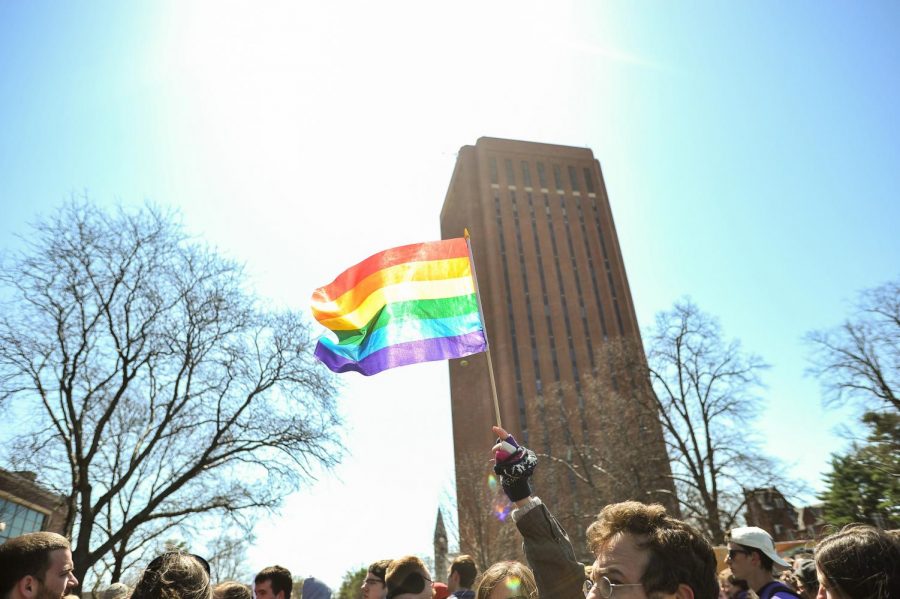Last week, Jocelyn Morffi, a teacher who had been employed at a Florida Catholic school for seven years, was terminated with the school citing a break in the morality clause of the contract signed by each faculty when hired. The breach in contract came when she posted pictures on social media of her marriage to another woman. Before the marriage, she was known to be both an excellent teacher and openly gay; parents and teachers were outraged over the actions of the school. When I saw this story, I instantly thought back to my experience of going to a Catholic high school. The difference between the two schools is astonishing.
While Saints Peter and Paul Catholic School in Miami feels compelled to fire gay teachers, other Catholic schools choose to ignore the anti-gay doctrine that has plagued the Church for so long. How can schools, all stemming from the same religion, differ on such a core value? The answer lies not in the beliefs of the Church itself, but rather the beliefs of the individuals within these institutions. Rather than blame the entirety of the Church, we have to remember that it is individuals who are susceptible to bigotry. Before looking further into this issue, we must first look toward the present and past of the issues of LGBT rights.
Not so long ago, a teacher being fired for their sexual identity would have been completely normal. Today, as we have seen gay marriage legalized, many like to think we are now living in an age of pure equality for LGBTQIA+ people, yet mask over the true discrimination in the workplace. Saints Peter and Paul’s reserved the right to fire Jocelyn Morffi due to a lack of LGBTQIA+ discrimination laws both in Florida and on the federal level. In 28 states, employers can fire employees for their sexual identities. Morffi’s termination is not simply an issue of the right to practice religion; it draws attention to the still-widespread acceptance of LGBTQIA+ discrimination in the workplace.
However, the school, being Catholic, emphasizes the global issue of this discrimination. Catholicism has experienced many dissents in recent times on the morality of sexual identity. The two sides are apparent, ranging from the traditionalists, who hold true to the belief that being gay is a mortal sin, to the progressives of the institution, who believe in the acceptance of all people.
Obviously being a world religion makes it difficult to have every practicing Catholic on the same page. When looking back on my Catholic school experience, I see a progressive side. My school, along with many others in the area, practiced on the side of acceptance. They supported gay straight alliance clubs and never conveyed any anti-LGBTQIA+ messages. Though the school now holds strong beliefs in equality, I know that this was not always the case. It is known among the school that there were times in its history that gay discrimination was rampant. However, the difference is that as time passed, steps were taken to end that discrimination. Saints Peter and Paul’s failed to make this adjustment into the modern age.
So how does this all come together, and what direction do we take in order to improve? First, we need to look at the individuals and collective groups that live in a state of discrimination. The Catholic Church as an institution officially holds the position that homosexuality is against the natural law, but many within the church actively avoid following this belief. Pope Francis wrote himself that he wishes priests worldwide would take a more accepting approach toward those in the LGBTQIA+ community. This is still far from the ideal. However, after seeing the kind nature of progressive Catholicism, I hope for continued improvements in the moral sentiment of the church moving toward acceptance. Schools and churches that continue to discriminate are stuck in a bigot’s world whether they are Catholic or not.
As for the non-Catholic side of this problem, I ask how we can still lack any federal protections for LGBTQIA+ employees. No person should live in fear of losing their job at any time due to their identity. It shows me that we still live in a state of complacency. Unless the issue becomes personal, many will continue to hold the belief that the LGBTQIA+ community lacks discrimination in the workplace.
For Jocelyn Morffi, my hope is that, through the injustice she experienced, there can be a movement toward societal improvement. I hope that outrageous events like this will motivate not only those directly effected, but everyone to fight against this oppression. To deny anyone the right to free love is as much a problem as denying someone their right to worship.
Cameron Smith is a Collegian columnist and can be reached at [email protected].




















Paige Giannetti • Feb 22, 2018 at 12:33 am
Remember the Pope said, regarding same sex marriage, “who am I to judge?”